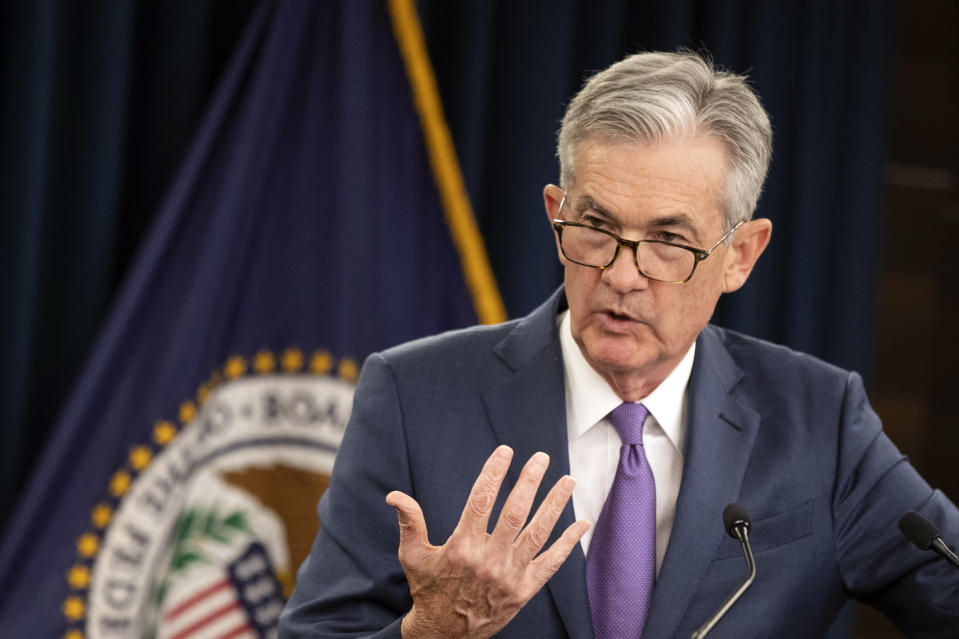Fed Chair Powell: Economy in favorable place but faces 'significant risk'
Federal Reserve Chairman Jerome Powell said Friday morning that the U.S. economy is in a “favorable place” but faces “significant risks” at the moment.
In his first public remarks since cutting interest rates for the first time since 2008, Powell reiterated that the Fed is committed to doing what it needs to do in order to “sustain the expansion.” Powell made the speech at the Fed’s annual symposium in Jackson Hole, Wyoming.
Powell acknowledged that the shorter-term challenges facing the U.S. economy have gotten tougher since the July 31 Federal Open Market Committee decision to cut rates by 25 basis points.
“The three weeks since our July FOMC meeting have been eventful, beginning with the announcement of new tariffs on imports from China,” Powell said.
Powell listed several other headlines as contributing to a “complex, turbulent” picture: slowdown in Germany and China, and geopolitical events like the growing possibility of a hard Brexit and the escalating tensions in Hong Kong. The chair also noted that equity markets have been “volatile.”
But Powell said the U.S. economy continues to “perform well overall,” citing consumer spending as the main driver. Although Powell said job creation has “slowed from last year’s pace,” he said inflation “seems to be moving up closer” to the Fed’s 2% target.
“Based on our assessment of the implications of these developments, we will act as appropriate to sustain the expansion, with a strong labor market and inflation near its symmetric 2 percent objective,” Powell said.

Powell said trade headlines have been particularly difficult for the Fed to model, since there are “no recent precedents” to guide Fed policy. He said policymakers would rely on data to address risks to the economy, but warned “it cannot provide a settled rulebook for international trade.”
“We can, however, try to look through what may be passing events, focus on how trade developments are affecting the outlook, and adjust policy to promote our objectives.”
Long-term challenges
Looking at longer-term challenges for the central bank, Powell said the Fed has faced three longer-term questions over the last half century.
From 1950 to 1982, Powell said the Fed struggled most with high inflation as a result of “stop and go” policy that showed the consequences of failing to anchor inflation expectations.
Powell said that there is an “unlikely” chance that the Fed faces too-high inflation, but said the Fed has the tools to address it if it arises.
Powell described the 1983 to 2009 period as a period of financial excess as a result of long expansions. Pointing to the collapse of hedge fund Long-Term Capital Management in 1998 and the tech stock bubble in 2000, Powell said the Fed needs to be mindful about how monetary policy can increase leverage in the system.
Powell said the banking system has more capital than it did pre-crisis.
Other policymakers have expressed worry in recent weeks that the Fed’s lower rates may spur more build-up in corporate debt and leverage loans.
Since 2010, the Fed has faced a new worry, Powell said: lower interest rates and an inability to predict exactly where the neutral rate for an economy should be.
“We must judge their locations as best we can based on incoming data and then add an element of risk management to be able to use them as guides,” Powell said.
-
Brian Cheung is a reporter covering the banking industry and the intersection of finance and policy for Yahoo Finance. You can follow him on Twitter @bcheungz.
Bonds, yields, and why it matters when the yield curve inverts: Yahoo U
YIELD CURVE INVERTS: Recession indicator flashes red for first time
Congress may have accidentally freed nearly all banks from the Volcker Rule
Read the latest financial and business news from Yahoo Finance

